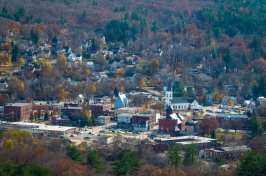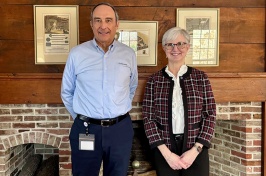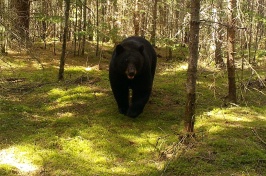NH Agricultural Experiment Station
Electromagnetic Therapy Potential Tool for Improving Dairy Herd Health
UNH partners with MagnaWave to explore pulsed electromagnetic therapy for dairy cows, showing promise for mastitis treatment and udder health improvement. Read More-
03/03/25
Living Labs: How Experimental Forests Offer Insights into Small Mammal Population Dynamics
UNH study reveals how small mammals adapt reproduction to forest seed cycles, influencing seed dispersal, tree regeneration, and forest ecosystem... -
02/03/25
Could Manure Help Cool-Climate Farmers Get Closer to Year-Round Farming?
UNH scientists innovate manure-powered systems to heat greenhouses, extending growing seasons for small farms while boosting sustainability and... -
01/03/25
In Consideration of New Approaches to Wildlife Research
UNH research reveals gaps in wildlife studies, calling for a balanced focus on smaller species to guide conservation efforts and prevent biodiversity... -
12/16/24
Phytoplankton Monitoring in Gulf of Maine as a Signal of Climate Change Impacts
UNH researchers study phytoplankton dynamics in the Gulf of Maine to understand climate change impacts, marine biodiversity shifts, and sustainable...
Recent Stories
-
04/05/23 - The 5 Rs of Environmentally Conscious ResearchThe Environmental Responsibility 5-R Framework (ER5F) is a tool to help scientists reduce the environmental impact of their research. ER5F stands for Recognition, Refinement,... Read More
-
02/24/23 - Monitoring Forest Edge Changes Using DronesScientists with the New Hampshire Agricultural Experiment Station (NHAES) and the UNH College of Life Sciences and Agriculture are using unpiloted aerial systems to examine how... Read More
-
02/22/23 - $1.26M Earmarked in Federal Budget for UNH’s NH Veterinary Diagnostic LabFor more than five decades, the New Hampshire Veterinary Diagnostic Laboratory (NHVDL) at the UNH College of Life Sciences and Agriculture has helped secure animal and public... Read More
-
02/16/23 - Tracking New Hampshire’s Moose Population Using Drones and Wildlife CamerasNew research led by New Hampshire Agricultural Experiment Station scientist Remington Moll assessed how emerging technologies may help improve population calculations of North... Read More
-
02/02/23 - New Study Examines Disproportionately High Food Insufficiency Rates Among LGBTQ+ New EnglandersNew study by NHAES researcher shows that while cisgender New Englanders face lower food insufficiency than others in the U.S., LGBTQ+ residents in the region face 2-3 times higher... Read More
-
12/19/22 - UNH Researcher Examines Abundance Factors of Striped Skunk Across Contiguous United StatesNew research from the New Hampshire Agricultural Experiment Station examines factors that affect skunk abundance in the region and across the United States, underscoring the... Read More
-
11/29/22 - Preventing Coccidiosis Using Sodium ButyrateStation scientist Pete Erickson, professor of dairy management in the UNH College of Life Sciences and Agriculture, has found evidence that the compound sodium butyrate—a nutrient... Read More
-
11/18/22 - Alternative Forages for Seasonal SlumpsIn farming, a ‘summer slump’ refers to the periods of the growing season when traditional forage plants—eaten by livestock—don’t grow well or aren’t readily available. Scientists... Read More
-
10/26/22 - Research That Makes a Difference for New HampshireBecky Sideman is performing sustainable agriculture research with great benefit to New Hampshire and New England. Read More
-
10/19/22 - Droughts Are a New Reality for New England. Diverse Crop Rotations Can Help.When it comes to crop rotations, complexity is key to boosting levels of nitrogen—a soil nutrient that is critical to crop production. That's according to new research involving... Read More






























































